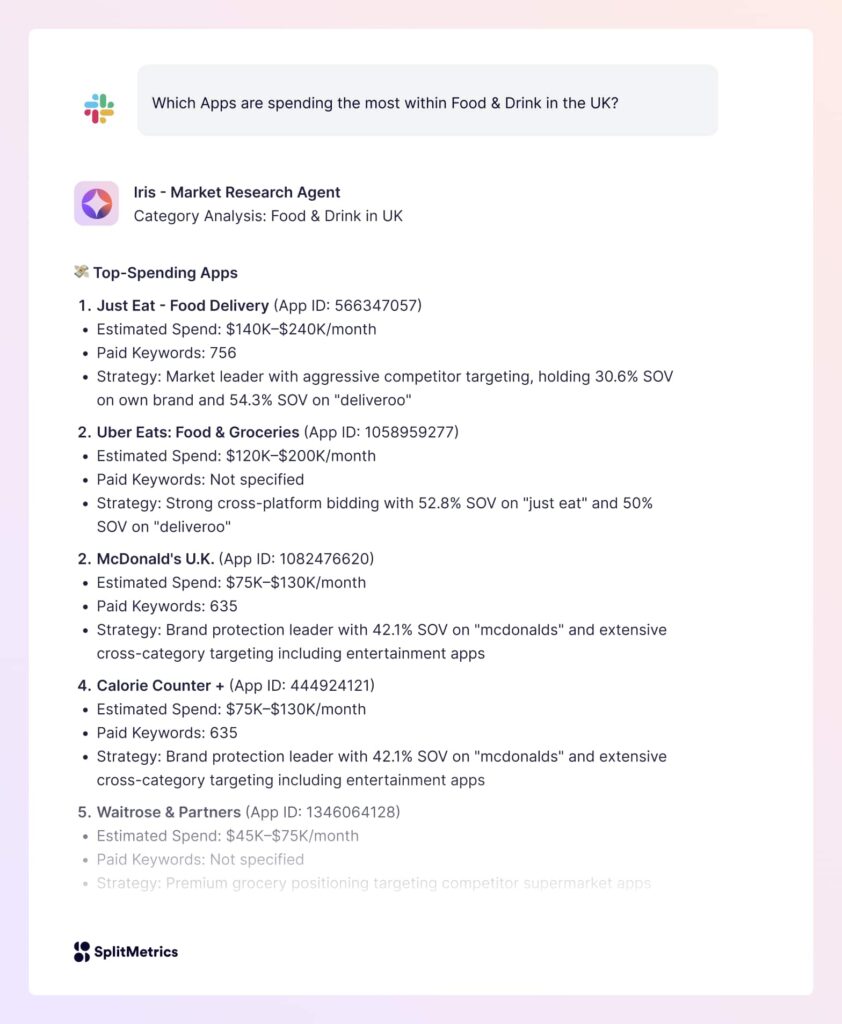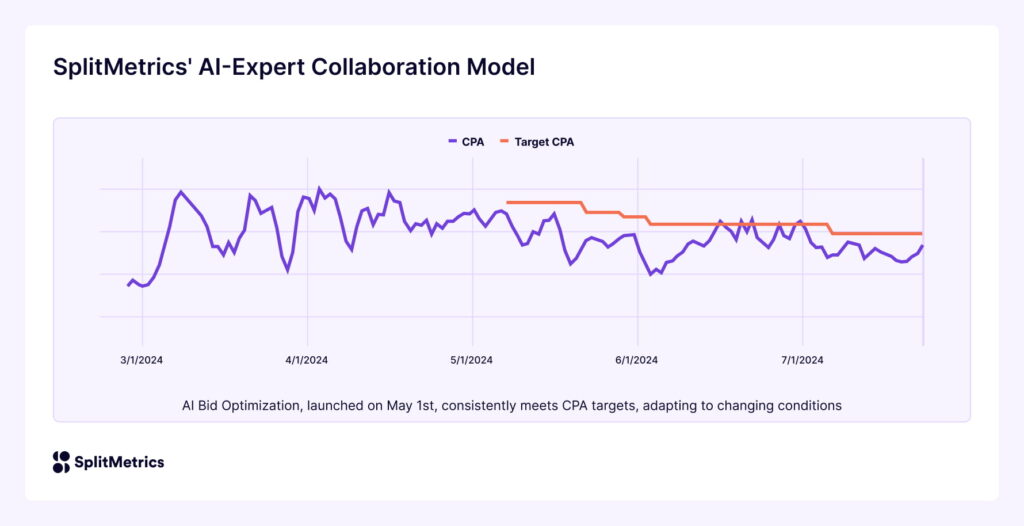How to Make AI Agents Work for App Marketers
 Gabriel Kuriata
Gabriel Kuriata Most companies today have adopted AI tools, but few have truly leveraged them to transform their business. The many figures in online circulation paint a picture of an incredibly dynamic market full of uncertainty.
Consider this: according to S&P Global’s Market Intelligence 2025 survey run in Europe and North America, 42% of companies abandoned their AI initiatives. RAND notes that over 80% of artificial intelligence projects fail, a rate twice that of other projects.
However, we know empirically that AI can successfully transform app marketing for any developer, as evidenced by our high-profile cases of Aveola and Flo.
Samba, our family of AI models for performance optimization, can deliver 55% ROAS increases in some cases. At the same time, Iris, our all-in-one AI Agent for Apple Ads & ASO, can streamline even the most complex competitive research.
The key to replicating that success lies in embracing the human in the loop (HITL) paradigm. At its heart is a clear understanding of what problems AI should solve (knowing what it does best) and what people should do (to provide the highest value to the company).
It’s also crucial to recognize the existence of an entire world of AI beyond ChatGPT and LLMs, enabling us to select the appropriate AI tools for our app marketing strategy and embrace AI-agent-human collaboration that goes way beyond conversations.
C-Level management should be prepared to reorganize our workflows to embrace human-AI agent collaboration, benefiting everyone in the company in the long run. Here’s how to do it.
An AI agent is a software system that uses artificial intelligence to autonomously pursue goals and complete tasks on behalf of a user. Agents operate rationally by perceiving their environment, reasoning, planning, making decisions, and taking action without constant human intervention.
Core abilities of an AI agent include:
AI agents often utilize large language models (LLMs) for reasoning and planning, which enables them to communicate easily with their users; however, this is not always necessary. Due to the high popularity of ChatGPT and other LLMs, we tend to think that it’s the core functionality, but it’s simply not the case, as we’ve described in our article on various types of AI.
AI agents solve specific problems and become better over time. This is their key characteristic that makes them a critical part of building competitive advantage in app marketing.
The two main reasons app marketing needs AI agents are their ability to handle complexity and perform mass operations efficiently. However, we must highlight that app marketing needs vertical AI that addresses its specific pain points. If AI is to do that, then it must be:
Vertical AI refers to an artificial intelligence system that is highly specialized and purpose-built for a specific industry, domain, or business function (see Samba’s development history to understand this process).
Unlike general-purpose (horizontal) AI, Vertical AI focuses on achieving deep expertise and high accuracy within a narrow niche. It’s meant to automate expert-level tasks and make highly reliable, domain-specific decisions.
| General AI | Vertical AI | |
| Core strength | Breadth, creativity | Depth, accuracy |
| Data source | Public web data | Domain-specific (ASO, spend, SoV) |
| Example | ChatGPT draft of ad copy | Iris is recommending budget reallocation |
| Risks | General suggestions for specific problems | Ignoring it while competitors move ahead |
The human-in-the-loop (HITL) paradigm is crucial in the development and training of a vertical AI, ensuring human oversight in an AI system’s function, data usage, and output. Humans are vital for guiding and correcting machine actions, providing critical thinking, judgment, and expertise to manage complex situations that AI currently struggles with, while machines excel at processing vast data and identifying patterns.
So, how exactly can a vertical AI agent help app marketing?
The definition of “big data” is fluid and context-dependent, primarily because the capabilities of technology (storage, processing power) are constantly advancing.
Instead of a specific volume threshold, the concept of “big data” is better defined by the challenges it presents and the tools required to manage it effectively. Ask yourself these two questions:
A “no” as an answer to any of these questions means that you’re working with big data, as most app marketers today are. We highlighted this issue in our journal, discussing how we developed artificial intelligence for performance optimization, and referencing that 67% of CMOs admit to being overwhelmed by the volume of data at their disposal.
Still, despite this complexity, all this data is critical to pushing boundaries of profitable campaign scaling. Complexity, analysis, and effective decision-making can be addressed in multiple ways, from utilizing effective, flexible dashboards and reports within app growth ecosystems like ours to employing AI Agents like Iris for in-depth, comprehensive analysis.

AI can handle the most tedious, repetitive, and computationally demanding tasks, and modern app marketing has no shortage of them.
Let’s take the seemingly simple process of bidding on keywords in Apple Ads for search results ads. When keywords are organized into a logical structure that reflects the user’s intent behind their search terms, they can be managed in bulk at the ad group level.

However, each keyword is unique, and individual analysis and optimization can have a significant impact on performance. The question is, can we manage each keyword individually with hundreds, or even thousands, of them — a figure that can be multiplied by international expansion? Can we do it daily? Most likely not, but AI can.
Samba can make 10x more bid adjustments to a single keyword in the same period than manual changes, an advantage over even the most sophisticated automation-rule configurations. Overall, Samba 2.5 can save more than 40 hours every month, adjusting bids 14 times faster, compared to manual optimization over 90 days.
Here is why AI agents for app marketing rely on app marketers (the Human-in-the-Loop):
An AI agent can optimize for a “Cost Per Install (CPI)” or “Cost Per Action (CPA),” but the app marketer defines their target values. An AI agent may provide insights for that decision, too, but it won’t read the external world for a truly accurate value. The marketer understands competitor strategy, product roadmap, seasonality, and important events, all of which contribute to the final goals.
Humans define and create the original, creative concepts and narratives that define a brand and drive success. An app marketer ensures that all AI-generated copy and visuals are 100% compliant with platform policies (like Apple Ads or Google Ads) and, more importantly, consistent with the brand’s unique voice, tone, and identity.
An AI agent can help you answer many questions related to the environment it’s operating in, like:
Still, it’s the human app marketer who can answer the bigger why: Is it because of exceptional app localization? Special features? Significant sports events? All these insights are critical for a successful strategy and require a broader perspective and critical analysis.
Additionally, app marketers close the feedback loop, providing critical feedback that reorients the model. This continuous validation is what makes the agent smarter and more reliable over time.
Creating a successful human-AI agent workflow involves designing the process around the Human-in-the-Loop (HITL) paradigm. The goal is to leverage AI’s speed and data processing power while using human judgment and accountability to manage risk and complexity.
The initial focus should be on the app marketer’s job, not the AI technology itself, as the latter is designed to solve the problems of the former. Here’s the plan:
C-Level support is the most critical factor for the successful adoption and scaling of human-AI agent workflows. It’s an organizational and cultural transformation that must be driven from the top. Here’s how C-Level leaders can champion human-AI agents:
Tie AI initiatives directly to strategic objectives, such as increasing market share through increased use of personalized messaging (like custom product pages), driving re-engagement through amplifying in-app events, or international expansion by handling bigger campaigns with your user acquisition team.
An AI agent should replace tasks, not people: you limit time spent on bid management to free up creative skill to increase the scope of your app growth tactics.
C-Level leadership must champion a strategy that reframes jobs, demonstrating to employees that AI agents will handle repetitive tasks, enabling humans to focus on high-value, creative, and strategic work.
This requires more than just AI literacy and teaching employees how to collaborate with agents, audit results, and override decisions. It requires a good understanding of our human resources and how they can be leveraged more effectively now that agents are taking over the mundane, leaving more space for the creative.
Maximizing impact and staying ahead requires revisiting whether a business has a few AI tools or a true AI strategy.
Embracing AI agents is a critical part of successful app growth. Economic uncertainty is high, with 77% of EMEA CxOs reporting significant challenges, leading to slower decisions and a demand for clarity.
By building a robust human-AI collaboration framework, app marketers and C-suite leaders can navigate this transformation, maximize productivity, and secure a competitive advantage.
